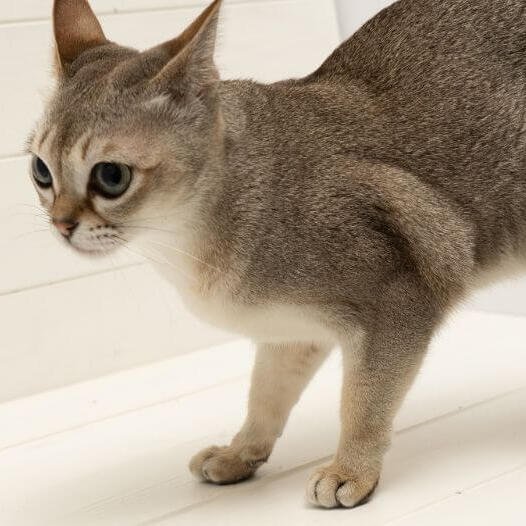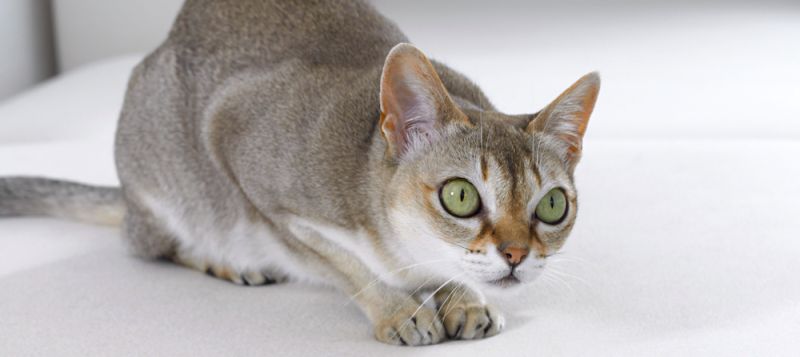
Any potential cat owner who prefers diminutive cuteness would be right to choose the Singapura for a breed. This Abyssinian-Burmese crossbreed is deemed as one of the smallest domestic cats in the world – spanning merely up to 8 inches in length.
As far as appearance is concerned, Singapura cats possess more than one fascinating irony. Belying their seemingly fragile size is a lean muscular physique that is naturally sculpted for ‘feline perfection’.
They only have a singular coat pattern, but it is resplendent enough to attract anyone who can appreciate an organic tapestry of granular coffee brown (sepia) fading to lighter shades of vanilla.
Another striking paradox concerning the Singapura cat is its origin. Despite the obvious national namesake (Singapore), the prime ancestor of this crossbreed was actually brought from the United States in 1974 by expatriate breeders – mistakenly registered as an Abyssinian upon entry.
Regardless of its controversial ethnic background, it didn’t take long for the Singapura cat to be officially recognized by both The International Cat Association (TICA) in 1979 and the Cat Fancier’s Association (CFA) in 1988.
Average Cost of a Singapura Cat
If you intend to purchase this unique crossbreed from trustworthy breeders, it is crucial for you to be able to glean a better understanding of the factors that influence the broad range of Singapura cats prices. In terms of quality, it is important to understand whether you intend to choose an animal companion that is categorized as either ‘pet quality’ or ‘show/breeder quality’.
A Singapura cat is classified as pet quality if it possesses physical traits that are rather meager or subpar in strict eugenics standards. Hence, the show/breeder certification is granted to the felines that are blessed with outstanding physical traits.
The American Cat Fancier’s Association provides a numerical basis for qualifying a show/breeder pedigree:
- Head: 35 points
- Body and tail: 20 points
- Coat: 15 points
- Color: 15 points
- Markings: 15 points
An Alabama-based breeder called the Catera Cattery provides one of the most vivid price disparities between the two aforementioned standards. The ‘pet quality’ costs $1,250 per kitten while the ‘show/breeder quality’ is priced up to $3,000.
Another important factor that affects the price of a Singapura cat is its sex. Due to their finer physique and generally more vulnerable health (birthing problems), the females are likely to fetch a more expensive cost.
A breeder based in North Carolina called Asiatica Cattery sells for $1,475 per female Singapura kitten while males are priced at $1,375.
Buying from reputable breeders also entails miscellaneous costs. It is important to understand that for a creature with a relatively scarce gene pool, there are too many covetous owners.
There won’t be enough for every potential buyer. There are those who are willing to spend extra to either be in the waiting list (while the kitten is unborn) or reserve their ownership (when the kitten is born).
A Connecticut-based breeder called Singville Cattery charges a separate fee of $100 to put prospective buyers in the waiting list. Reservation, which already includes the processing of ownership documents, costs up to $500.
Adopt, Not Shop!
Although the demand for cats of unique high-profile pedigree has far from diminished, the system that perpetuates the sale of these creatures still leaves some of them homeless. It is important to consider how eugenics strictly determines whether or not a cat is worth buying.
Those that didn’t even pass for ‘pet quality’ may end up being abandoned. Such is the cruel result of consumerism.
At the forefront of this social injustice are animal rescuers who strive to give abandoned animal companions a second chance in life.
The Humane Society of the United States estimates that out of 3.2 million cats euthanized each year, roughly 80% of them are considered healthy or treatable. No feline, especially something as fragile as the Singapura, deserves such dark fate.
Getting a Singapura cat from shelters and foster homes not only help advance a very noble cause. It also saves you a substantial amount of money.
Specialty Purebred Cat Rescue (SPCR), a humane society based in the East North Central of the United States, features the following adoption fees:
- Domestic cats: $50 to $125
- Purebred mix cats: $75 to $175
- Purebred cats: $100 to $400
- Rare purebred cats: $250 to $600

Overall Living Expenses
Buying a Singapura cat is already costly by itself. However, that is just but a portion of the total monetary value you will be spending as soon as your stewardship begins.
This feline breed has an average lifespan of 10 to 15 years, although it is not unusual for some to reach their 20’s.
Raising an animal companion is a serious long-term investment. Some of these living expenses need to be shouldered regularly while others are one-time payments.
Consider the following lifestyle aspects of your Singapura cat and how you can use it a basis for smart spending:
Feeding – As mentioned earlier, the Singapura cat is comparatively very small, measuring an average body length of 8 inches. These cats can weigh only as much as 8 pounds, despite the fact that they pack so much energy that leaving them idle is just a bad idea. Judging from these factors, experts calculate their recommended energy needs to be around 258 calories per day.
Choosing a commercially available cat food is relatively easy. However, cats also need to acquire essential nutrients from their naturally-conducive sources. Despite their seemingly delicate and polished physiology, the Singapura (like all cats) are also carnivorous. Counting the recommended energy requirement based on a raw diet is also a worthy challenge to undertake.
- 18 pounds of dry food: Up to $26
- 24 cans of 3-ounce wet food: Up to $26
- 3 pounds of rabbit meat: Up to $20
Hygiene – General cleanliness is also not a well-known liability when it comes to owning a Singapura cat. Since they prefer to stay indoors, the likelihood of getting filthy is negligibly slim. These cats rarely require a bath. However, it is worth mentioning that they are also not hypoallergenic.
You only need to groom their coat once a week. Fortunately, their hair is not long and prone to tangling. This task can be accomplished at a relatively leisurely pace. More importantly, these loveable little ones would definitely enjoy the bonding experience.
While these little felines could hardly tell the difference between ‘lap cuddles’ and hair-brushing, getting their nails clipped can be quite a herculean task. It has been a well-known fact that Singapura cats get upset when people touch their toes – let alone cut off a part of them. It is therefore important to condition an adopted cat to have their nails trimmed at a very young age so that it won’t be a stressful experience during adulthood.
As for their toilet needs, their size can be the key to choosing the right litter box. It is worth mentioning that you might be able to fetch a bargain based on how dimensions can affect the price. Such an item goes well with a quality cat litter material.
- Bristle brush: Up to $10
- Nail clippers: Up to $12
- PetMate Booda Dome Cleanstep Litter Box: Up to $32
- 28 pounds of cat litter: Up to $28
Equipment – Being the muscular sort of felines, it comes to no surprise that Singapura cats also pack a lot of energy. These cats can easily impress their audience with their natural climbing and high-jumping skills and they are very eager to show off at a moment’s notice. But without anyone to witness their antics, these felines would feel very anxious. Just like the Exotic Shorthair, turning the radio or television ‘might’ mask your absence – until the little one ends up exploring every corner of the home interiors.
Unless you have a child or a dog that will stick around in your absence as regular playmates and ‘chill buddies,’ you might need to shower them with interactive toys. Another downside to being lonesome is that these felines embody the nouns ‘curiosity’ and ‘cat’ in an infamous precautionary phrase. Without something fun to poke around with their paws, you might as well say goodbye to some of your small fragile household items.
The Singapura cat is also easily provoked by loud noises. This can be very challenging for cat owners who live in densely populated areas with 24-hour audible traffic clatter. If such is your home, you might need to invest in certain mechanisms/instruments that buffer outside noise.
However, you can also spare yourself the trouble if you instead bring this feline along in your journey instead of leaving them alone at home (which is relatively preferable). Once again, their size makes an excellent fit for a cat backpack.
- Cat bridge: Up to $188
- Cat condo: Up to $146
- Robot mouse: Up to $12
- Teaser wand: Up to $15
- Cat backpack: Up to $40
Health – One of the best reasons to choose Singapura cats as pets is their general well-being. These small felines are quite robust. As indoor cats, their chances of suffering serious injuries are also too slim either.
Nevertheless, it is important to be financially prepared for urgent appointments to the vet clinic. If you do not have a few thousand dollars stashed for emergency treatment, you can instead avail for pet insurance (and pay for its periodic premium).
Despite being a durable breed, Singapura cats also has their own share of infamous conditions. Among the most common include renal failure which is directly inherited from their Abyssinian ancestors.
Others comprise of hyperthyroidism and anemia – the latter being a direct consequence of a genetic anomaly called Pyruvate Kinase Deficiency.
Lastly, there’s more to just ‘problematic birthing’ that made females a somewhat more valued creature among breeders. In fact, an overwhelming percentage of female Singapura cats are prone to uterine inertia – a physical state that requires mother cats to undergo caesarian section as the only means of successfully delivering a baby.
Preparing for these potential infirmities (except caesarian birth) means undergoing relevant diagnostic tests and medical procedures. Here is an example of the price list for each medical service provided by a Florida-based Tequesta Veterinary Clinic:
- Blood count: $90
- T4 test: $90
- Urine test: $25 to $45
- X-ray: $140 to $175
- Ultrasound: $40 to $65
- Biopsy test: $145
